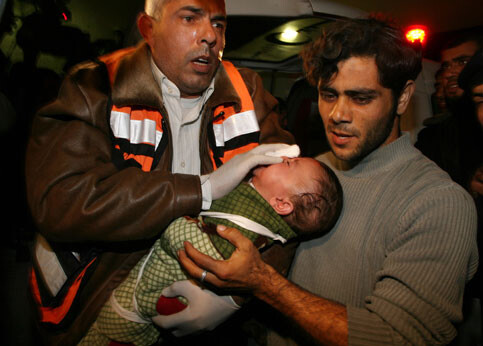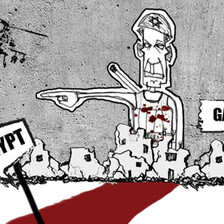The Electronic Intifada 29 February 2008

Palestinian medics carry a wounded child after an Israeli missile destroyed the labor union headquarters in Gaza, 28 February 2008. (Wissam Nassar/MaanImages)
Israeli officials began damage limitation efforts after the country’s deputy defense minister Matan Vilnai threatened Palestinians in the occupied Gaza Strip with a “holocaust.”
The comments came a day after Israeli occupation forces killed 31 Palestinians, nine of them children, one a six-month-old baby, in a series of air raids across the Gaza Strip. Israel claimed that the attacks were in retaliation for a barrage of rockets fired by resistance fighters in the Gaza Strip which killed one Israeli in the town of Sderot on Wednesday, 27 February. Palestinian resistance groups, including Hamas, said the rockets were in retaliation for the extrajudicial execution of five Hamas members carried out by Israel on Wednesday morning. Israeli occupation forces have killed more than 200 Palestinians since the US-sponsored Annapolis peace summit last November. In the same period, five Israelis have been killed by Palestinians.
Speaking to Israeli army radio today, Vilnai said, “the more Qassam [rocket] fire intensifies and the rockets reach a longer range, [the Palestinians] will bring upon themselves a bigger shoah because we will use all our might to defend ourselves.”
A report on the BBC News website headlined “Israel warns of Gaza ‘holocaust’ ” noted that the word “holocaust” — shoah in Hebrew — is “a term rarely used in Israel outside discussions of the Nazi genocide during World War II.”
The BBC later reported that “many of Mr. Vilnai’s colleagues have quickly distanced themselves from his comments and also tried to downplay them saying he did not mean genocide.” An Israeli foreign ministry spokesman, Arye Mekel, claimed that Vilnai used the word “in the sense of a disaster or a catastrophe, and not in the sense of a holocaust.”
The attempt to limit the damage of Vilnai’s comments is not surprising. It was recently revealed how another Israeli official, Major-General Doron Almog, narrowly escaped arrest at London’s Heathrow airport in September 2005, in connection with allegations of war crimes committed against Palestinians in the occupied territories. British police feared a gunfight if they attempted to board the El Al civilian aircraft on which Almog had arrived and on which he hid until he fled the United Kingdom back to Israel as a fugitive from justice.
Incitement to genocide is a punishable crime under the international Genocide Convention, adopted in 1948 after the Nazi holocaust.
“The 8 Stages of Genocide,” written by Greg Stanton, President of Genocide Watch, sets out a number of warning signs of an impending genocide, which include “dehumanization” of potential victim groups and preparation, whereby potential victims “are often segregated into ghettoes, deported into concentration camps, or confined to a famine-struck region and starved.” [1]
Vilnai’s holocaust threat, however much Israeli officials attempt to qualify it, fits into a consistent pattern of belligerent statements and actions by Israeli officials. Israel has attempted to isolate the population of Gaza, deliberately restricting essential supplies, such as food, medicines and energy, a policy endorsed by the Israeli high court but condemned by international officials as illegal collective punishment.
As The Electronic Intifada has previously reported, dehumanizing statements by Israeli political and religious leaders directed at Palestinians are common (see “Top Israeli rabbis advocate genocide,” The Electronic Intifada, 31 May 2007 and “Dehumanizing the Palestinians,” Ali Abunimah, The Electronic Intifada, 21 September 2007)
On 28 February, Vilnai’s colleagues added their own inflammatory statements. Cabinet minister Meir Sheetrit stated that Israel should “hit everything that moves” in Gaza “with weapons and ammunition,” adding, “I don’t think we have to show pity for anyone who wants to kill us.”
And today, Tzachi Hanegbi, a senior member of Israeli Prime Minister Ehud Olmert’s Kadima party said that Israel should invade Gaza to “topple the Hamas terror regime” and that Israeli forces, which now enforce the occupation of Gaza from the periphery and air, should prepare to remain in the interior of the territory “for years.”
While Israeli leaders escalate the violence and threats, some other top officials and a vast majority of the Israeli public support direct talks with Hamas to achieve a mutual ceasefire, something Hamas has repeatedly offered for months.
“Sixty-four percent of Israelis say the government must hold direct talks with
the Hamas government in Gaza toward a cease-fire and the release of captive
soldier Gilad Shalit,” the Israeli daily Haaretz reported on 27 February citing a Tel Aviv University poll. The report noted that half of Likud supporters and large majorities of Kadima and Labor party voters support such talks and only 28 percent of Israelis still oppose them.
Knesset Member Yossi Beilin, leader of the left-Zionist Meretz-Yahad party, called for an agreed ceasefire with Hamas, noting that “there have been at least two requests from Hamas, via a third party, to accept a cease-fire,” Haaretz reported on 29 February. Israel’s public security minister, Avi Dichter, visiting Sderot the previous day, criticized Israel’s military escalation, saying, “Whoever talks about entering and occupying the Gaza Strip, these are populist ideas which I don’t connect to, and in my opinion, no intelligent person does either.” And, in an interview with the American magazine Mother Jones, published on 19 February, the former head of Israel’s Mossad intelligence agency, Efraim Halevy, repeated calls for Israel and the US to negotiate a ceasefire with Hamas. Dismissing lurid rhetoric about the group, Halevy stated that “Hamas is not al-Qaida,” and “is not subservient to Tehran.”
The question remains as to why when the vast majority of Israelis and Palestinians, some senior Israeli officials, and Hamas leaders are all talking about a ceasefire, the Israeli government refuses to accept one and the US refuses to call for one. US Secretary of State Condoleezza Rice has blamed the escalating bloodshed entirely on Hamas, and has failed to call for a ceasefire. This echoes her support for Israel’s merciless 2006 bombardment of Lebanon which she notoriously celebrated as being “the birth pangs of a new Middle East.”
The Palestinian and Israeli populations are exhausted by the relentless bloodshed, however unequal its toll. They are paying the price of a failed policy, pushed by Washington and its local clients, which attempts to demonize, isolate and destroy any movement that resists the order that the United States seeks to impose on the region.
Co-founder of The Electronic Intifada, Ali Abunimah is author of One Country: A Bold Proposal to End the Israeli-Palestinian Impasse (Metropolitan Books, 2006).
Related Links
Endnotes
[1] See: http://www.genocidewatch.org/aboutgenocide/8stagesofgenocide.html





